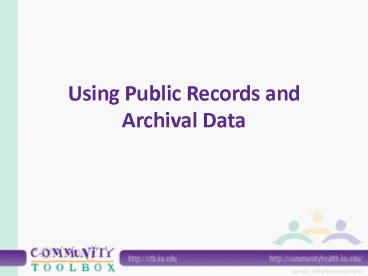Using Public Records and Archival Data PowerPoint PPT Presentation
1 / 8
Title: Using Public Records and Archival Data
1
Using Public Records and Archival Data
2
What are public records and archival data?
- Public records of a public entity that are
available to the public by law. Archive a
storehouse - literal and/or electronic - of print
and other material that has been kept to preserve
the history of the body or place they relate to.
3
Why use public records and archival data?
- They're relatively easy for most people to gain
access to. - They can give you information about the history
or status of the community that it would be
difficult to get elsewhere. - They often make comparisons of your community
with others.
4
Why use public records and archival data? (cont.)
- They help you use your time efficiently.
- Their information may keep you from making
important mistakes. - They're part of an information package that will
give you the most accurate and complete picture
of the aspects of the community that you're
concerned with.
5
Who should use public records and archival data,
and when?
- Any group or individual involved in community
assessment - Community activists wanting to understand their
issue better and support their arguments with
accurate facts and figures. - Community historians needing a picture not only
of the "objective" history of the community, but
also of the human history.
6
Who should use public records and archival data,
and when? (cont.)
- Health and human service organizations needing
information about the current state of the
community, its past history with particular
issues, and previous prevention efforts or
solutions. - Public officials and other policy makers engaged
in community assessment or in trying to
determine policy on a particular issue.
7
How do you use public records and archival data?
- Determine what type of information you need
history, demographic, health-related, economic,
housing, land use and development, etc. - Determine where to find the information census
data, federal, state, or local records, federal,
state, or local archives, or the archives of
media, libraries, museums, universities, and
other institutions and organizations.
8
Use the information intelligently
- Don't swamp yourself with information.
- Use community-level indicators to tell you more
about the reality of the community's
circumstances. - Examine the social determinants of issues.
- Use comparisons with similar communities where
you can to understand whether the issues in your
community are exceptional. - Think about the different ways you can find out
what you want to know

